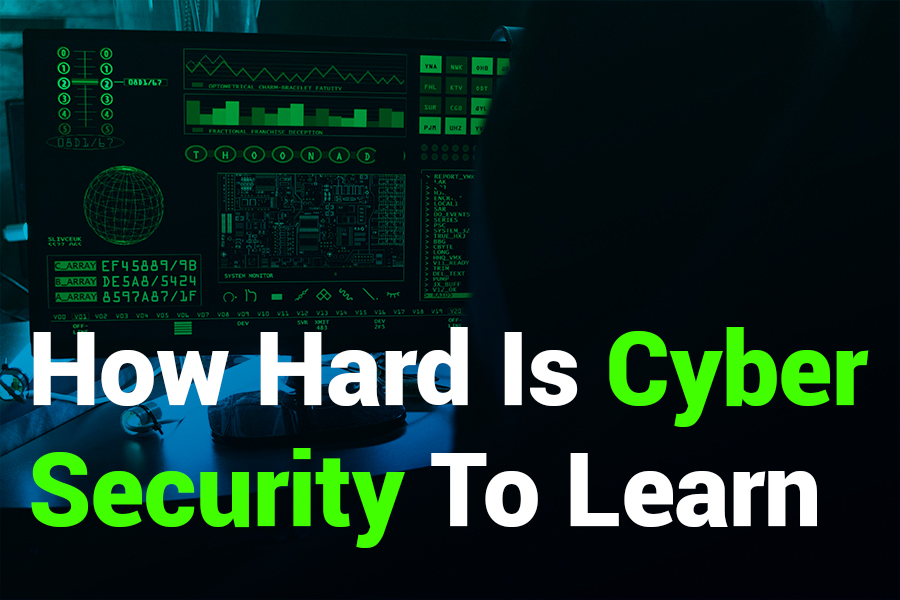Cyber security is a rapidly growing field with increasing demand for skilled professionals who can protect organizations from digital threats. But for those considering this career, one key question often arises: [How Hard is Cyber Security to Learn]? With a blend of technical skills, continuous learning, and a strong analytical approach, cyber security can seem challenging for beginners. Yet, the difficulty varies based on your background, dedication, and learning strategy.
In this article, we’ll explore what makes learning cyber security challenging and rewarding. We’ll cover the essential skills required, the learning curve, and the resources available to help you succeed in this field. Whether you’re a complete beginner or transitioning from another tech area, this guide will offer a realistic overview of what it takes to master cybersecurity and excel in this dynamic industry.
How Hard is Cyber Security to Learn?
Cybersecurity can be challenging to learn, but the level of difficulty depends on your background and learning approach. For beginners, the field requires grasping foundational concepts like networking, system architecture, and security principles. With the right resources and dedication, however, many find cybersecurity manageable and rewarding. Courses, certifications, and hands-on labs can ease the learning curve, while practice and continuous learning help you stay current with evolving threats. Overall, learning cybersecurity may be hard at first, but with persistence, it becomes accessible and offers a fulfilling career path.
What Makes Cyber Security Hard to Learn? Challenges for Beginners
For those new to the field, learning cybersecurity can initially feel overwhelming. The field combines a variety of skills, from technical proficiency in networking and coding to analytical abilities for identifying vulnerabilities. One of the main challenges is the vastness of the field—covering areas like ethical hacking, incident response, and digital forensics. Each area requires specialized knowledge, making it challenging to decide where to start.
Another difficulty lies in the constant evolution of cyber threats. Cybersecurity professionals must stay updated on the latest vulnerabilities and attack methods. This requires ongoing learning, as a skill or concept learned today might need to be adapted or upgraded within a few years. Additionally, many entry-level roles demand practical experience, so building hands-on skills is essential for breaking into the field. Beginners often find labs, simulations, and virtual environments helpful for gaining practical experience, but developing confidence can take time.
Despite the initial difficulty, learning cybersecurity can be manageable with the right approach. Resources such as online courses, boot camps, and certifications provide structured learning paths, allowing students to build foundational skills and progress at their own pace. For those willing to commit to continuous learning and problem-solving, cyber security offers an accessible and rewarding career path.
Why Learn Cyber Security? Motivations and Benefits
Learning cyber security offers multiple benefits, from job security to intellectual fulfillment. Here’s why many choose to enter this field:
Career Opportunities
The demand for cyber security professionals is high, with roles available across various industries like finance, healthcare, and government. Learning cyber security opens doors to lucrative and stable careers.
Intellectual Challenge
Cyber security is intellectually stimulating, requiring continuous problem-solving. Those who enjoy analytical work often find satisfaction in identifying and resolving security issues.
Flexibility and Mobility
Cyber security skills are applicable worldwide, providing career flexibility. Many roles allow for remote work, making it easier to balance personal and professional life.
Potential for Growth
The field offers plenty of room for growth, with opportunities to specialize in areas like ethical hacking, digital forensics, and threat intelligence.
Contribution to Society
By protecting data and digital infrastructure, cyber security professionals make a tangible impact on society. They help businesses, organizations, and individuals stay safe in the digital world.
Essential Skills Required to Learn CyberSecurity
To succeed in cyber security, mastering several key skills is essential. Here’s a breakdown of the foundational skills needed:
- Networking Fundamentals
Understanding network protocols, IP addresses, and data transfer methods is crucial for identifying and mitigating network-based attacks. - System Administration
Familiarity with operating systems, particularly Linux and Windows, is necessary to understand system vulnerabilities and configure secure environments. - Programming and Scripting
Basic knowledge of programming languages like Python or Bash is beneficial, especially for those interested in ethical hacking and automation. - Analytical Thinking
Analyzing threats and identifying patterns are central to cyber security. Strong analytical skills help professionals detect potential security gaps. - Risk Assessment
Being able to assess risk and prioritize threats based on their potential impact is an essential skill for making informed security decisions.
How to Approach Learning Cyber Security: Tips and Resources
Learning cyber security requires a strategic approach. Here’s how to make the process more manageable:
Start with Foundational Knowledge: Begin by understanding the basics of networking, system administration, and security concepts. Building a strong foundation is key to mastering more complex topics.
Utilize Online Courses and Certifications: Online platforms like Udemy, Coursera, and CompTIA offer beginner-friendly courses that cover essential topics. Certifications, such as CompTIA Security+, can also boost your knowledge and credentials.
Gain Hands-On Experience: Practical experience is vital in cyber security. Set up virtual labs, participate in Capture the Flag (CTF) challenges, and explore sandbox environments to practice skills in real-world scenarios.
Stay Updated on Cyber Security News: Follow industry news and blogs to stay informed about new vulnerabilities and threat trends. Sites like Krebs on Security and Threatpost are excellent resources for updates.
Network with Industry Professionals: Joining online forums, attending meetups, and connecting with cyber security experts on LinkedIn can provide valuable insights and guidance for beginners.
Cyber Security Certifications: Do You Need Them?
Cyber security certifications validate your skills and make you more competitive in the job market. Here’s an overview of popular certifications and their relevance:
CompTIA Security+
A foundational certification, Security+ covers essential cyber security concepts. It’s ideal for beginners looking to enter the field.
Certified Ethical Hacker (CEH)
The CEH certification focuses on ethical hacking techniques. It’s suitable for those interested in penetration testing and security assessments.
CISSP (Certified Information Systems Security Professional)
CISSP is an advanced certification for experienced professionals. It covers in-depth security concepts and is often a requirement for senior roles.
GIAC Security Essentials (GSEC)
The GSEC certification covers practical skills in information security, making it suitable for those looking to validate their hands-on experience.
Certified Information Security Manager (CISM)
The CISM certification is management-focused, ideal for those who want to lead security teams and handle risk management.
The Learning Curve in Cyber Security: How Long Does It Take to Become Proficient?
Becoming proficient in cyber security varies depending on factors like prior experience, learning pace, and dedication. Here’s an estimate based on different backgrounds:
- Beginners with No Experience
For absolute beginners, becoming proficient may take one to two years with consistent study and hands-on practice. Starting with basic certifications like CompTIA Security+ can help accelerate the process. - IT Professionals Transitioning to Cyber Security
Those with a background in IT often find the transition smoother. They can focus on security-specific skills, potentially achieving proficiency in six months to a year. - Dedicated Cyber Security Students
Students enrolled in cyber security degree programs typically gain foundational knowledge within two to four years. They benefit from structured learning and hands-on labs.
While timelines vary, continuous learning is essential in this field. The cyber security landscape changes frequently, so professionals must commit to ongoing skill development.
Conclusion
So, [How Hard is Cyber Security to Learn]? While it poses unique challenges, cyber security is accessible to those with a solid plan, dedication, and a willingness to learn. Building foundational knowledge in networking and system administration, developing problem-solving skills, and gaining hands-on experience are key to success in this field. For beginners, the learning curve can seem steep, but with the right resources, certifications, and continuous practice, anyone with interest can excel in cyber security.
Cybersecurity offers a rewarding career path filled with intellectual challenges, job security, and the chance to make a difference. By embracing a mindset of continuous learning and resilience, you can navigate the complexities of this field and enjoy a successful career in protecting digital infrastructure.
FAQ’s
Q. How hard is cybersecurity for beginners to learn?
A. Cybersecurity can be challenging initially, especially for those new to IT concepts. However, with foundational learning and practical experience, it becomes manageable.
Q. What skills are essential for learning cyber security?
A. Key skills include networking fundamentals, system administration, programming basics, analytical thinking, and risk assessment abilities.
Q. How long does it take to learn cybersecurity?
A. Timelines vary, but beginners typically need one to two years of dedicated learning, while IT professionals may transition within six months to a year.
Q. Are certifications necessary to learn cyber security?
A. Certifications like CompTIA Security+, CEH, and CISSP validate skills and are beneficial for job opportunities, though not strictly necessary for learning.
Q. Can you learn cyber security without a technical background?
A. Nontechnical learners can succeed in cyber security by starting with foundational courses and progressing gradually to more complex topics.







